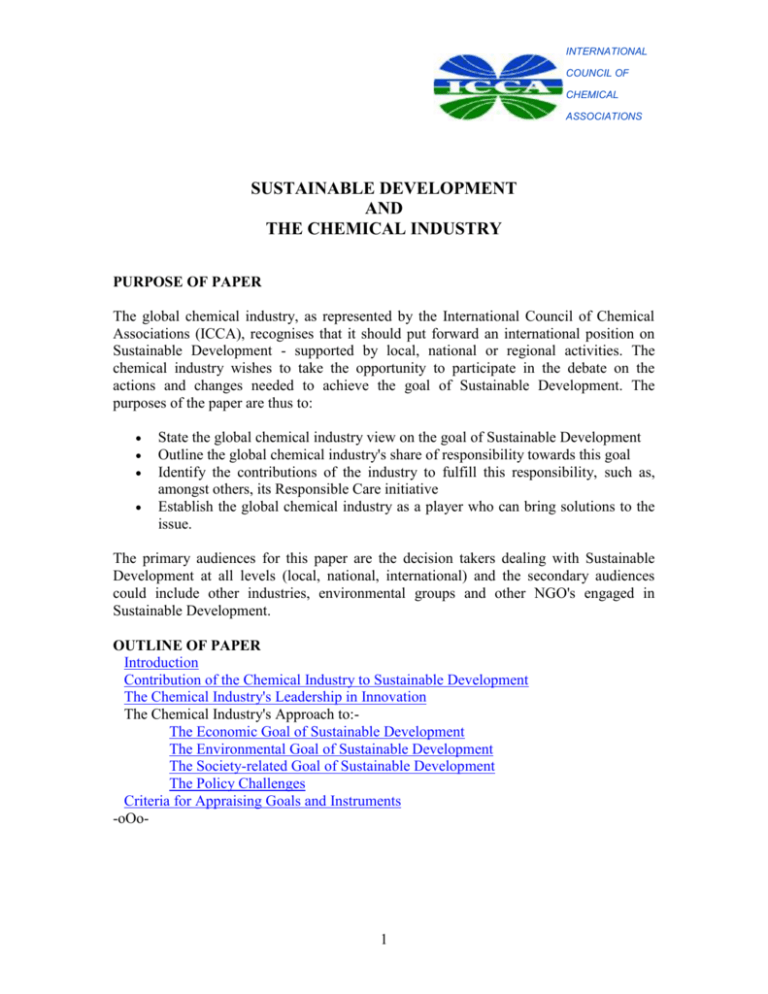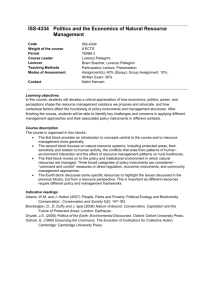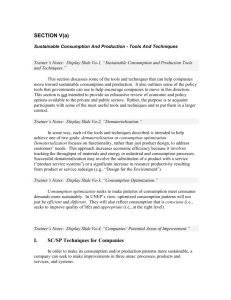Sustainable Development. The chemical industry
advertisement

INTERNATIONAL COUNCIL OF CHEMICAL ASSOCIATIONS SUSTAINABLE DEVELOPMENT AND THE CHEMICAL INDUSTRY PURPOSE OF PAPER The global chemical industry, as represented by the International Council of Chemical Associations (ICCA), recognises that it should put forward an international position on Sustainable Development - supported by local, national or regional activities. The chemical industry wishes to take the opportunity to participate in the debate on the actions and changes needed to achieve the goal of Sustainable Development. The purposes of the paper are thus to: State the global chemical industry view on the goal of Sustainable Development Outline the global chemical industry's share of responsibility towards this goal Identify the contributions of the industry to fulfill this responsibility, such as, amongst others, its Responsible Care initiative Establish the global chemical industry as a player who can bring solutions to the issue. The primary audiences for this paper are the decision takers dealing with Sustainable Development at all levels (local, national, international) and the secondary audiences could include other industries, environmental groups and other NGO's engaged in Sustainable Development. OUTLINE OF PAPER Introduction Contribution of the Chemical Industry to Sustainable Development The Chemical Industry's Leadership in Innovation The Chemical Industry's Approach to:The Economic Goal of Sustainable Development The Environmental Goal of Sustainable Development The Society-related Goal of Sustainable Development The Policy Challenges Criteria for Appraising Goals and Instruments -oOo- 1 INTRODUCTION The key finding of "Our Common Future", (the 1987 report of the United Nations' World Commission on Environment and Development), is that environmental, economic and social concerns must be integrated if the world's peoples are to advance and develop without jeopardizing the natural environment on which all life depends. Although today we cannot define the needs of future generations, the challenge for today's leaders is to pursue policies that will leave available an array of choices for future generations to meet their own needs. Sustainable Development will only come about if three goals - economic, environmental and society-related - can be reconciled. To determine the limits of acceptability and scope for action requires a set of conventions which society at large accepts as valid. Sustainability in economic terms means the efficient management of scarce resources as well as a prospering industry and economy. Sustainability in the environmental sense means not placing an intolerable load on the ecosphere and maintaining the natural basis for life. Seen from society's viewpoint, sustainability means that human beings are the centre of concern. In view, particularly, of the population increase worldwide, there needs to be provided as large a measure of equal opportunities, freedom, social justice and security as possible. The chemical industry views Sustainable Development as a challenge put before all parts of society. In the advances made in its own operations, its improved performance and in the improvements to the human condition made through its products, the chemical industry sees cause for optimism and believes that Sustainable Development can be the intellectual framework around which the chemical industry, other industries and other sectors of society can reach consensus on how to improve living standards and the environment. The main challenges facing the world include: Optimizing the benefits obtained from depleting resources Assuring against excessive strains placed on the eco-system The dynamic growth of the world population Remedying social and economic inequalities These are challenges on a global scale. It follows, therefore, that the attainment of Sustainable Development will call for action on the part of the people, governments, businesses and organisations around the world. The global chemical industry has realized this challenge. CONTRIBUTION OF THE CHEMICAL INDUSTRY TO SUSTAINABLE DEVELOPMENT The chemical industry is a key industry. Its products and services are instrumental in meeting the needs of mankind. It is present in all areas of life, from food and clothing, housing, communications, transport - right through to leisure activities. In addition, it 2 helps to solve the problems of other sectors of industry, such as the energy sector, information technologies, environmental industries and the waste disposal sector, as examples. Due to its size, the chemical industry is an important supplier to a broad range of downstream industries and is, as well, a customer of a broad range of products and services from other industries. It follows, therefore, that the chemical industry plays a major role in providing/ supporting performance improvements, research and development progress and, last but not least, employment in other industries. In itself, it is a large-scale provider of jobs and makes a significant contribution to wealth creation and, hence, to the financing of both public works and the exercise of public responsibilities. Since living standards are determined to a large degree by material considerations, it is clear that the chemical industry with its unique capabilities is in a position to make a decisive contribution to Sustainable Development. Commitment by the world chemical industry to the concept of Sustainable Development requires words to be transposed into company-specific action programmes in order to provide a framework for all those working in the sector. Its "Responsible Care" initiative, self-monitoring systems and other voluntary programmes such as Sustainable Technology (SUSTECH), Education-Industry Partnerships, Energy Efficiency Programmes are also part of this framework. Thereby, companies are also confronted with new challenges and must act responsibly. They must take account of the consequences of their actions upon society and future generations. The global chemical industry believes that the key to improving the performance of the industry is both its commitment to achieving environmentally sound Sustainable Development and improved performance and transparency. Under the concept of "Responsible Care", chemical companies are committed, in all aspects of safety, health and protection of the environment, to seek continuous improvement in performance, to educate all staff and work with customers and communities regarding product use and overall operation. Through these efforts the industry is improving its efficiency, reducing risks to health and the environment and making better products which, in turn, help individual and industry customers. THE CHEMICAL INDUSTRY's LEADERSHIP IN INNOVATION The very notion of Sustainable Development will require new approaches in a number of areas. Innovation at all levels and in all fields of activity is the most effective instrument for ensuring that the economic, and environmental goals, as well as those of society, are being advanced. The chemical industry's contribution is to continue innovation of new products that meet customer needs and manufacturing processes that reduce risks to health and the environment. This contribution is based upon the knowledge and experience the industry has acquired from applying innovation not only to making, handling and use of chemical compounds, but also to reprocessing, recycling and solving environmental problems. The 3 challenge facing the chemical industry is to maximize innovation, which can contribute to society meeting its goals for Sustainable Development. The chemical industry is firmly convinced that leadership in innovation represents the best way of attaining Sustainable Development. For the individual company, this means: a consistent orientation towards products, technologies and solutions which offer the greatest promise for the future development of new integrated environmental technologies a close cooperation with the customers of the chemical industry adaptation to the conditions of global competition bringing the most promising products quickly on the market strengthening the R&D effort which requires resources which can only be financed from profitable earnings actively contributing ideas and suggestions to the policy debates taking place in society improving process yield (efficiency). APPROACH TO THE ECONOMIC GOAL OF SUSTAINABLE DEVELOPMENT The internationalization of the economy at large, in conjunction with a growing trend towards global competition, is becoming more and more apparent. This is being manifested by: an increase of imports and exports of goods as well as services growing outward and inward flows of direct investment an ever increasing exchange of technology transfers globalization of monetary and financial schemes. The inter-relation of economic systems is complex, with a variety of relationships among countries. Multi-national chemical companies apply common standards in spreading investment capital and stimulating markets around the globe, thus setting the scene for the world market. What they need, in order to play a constructive role in Sustainable Development, is, first and foremost, freedom and fairness in international trade. Trade as an engine of economic growth is essential for Sustainable Development. A climate needs to be fostered within which such growth may take place on the basis of a clear set of rules with predictable consequences, by which investors may be guided in their long-term decision-making process. This includes bringing to a halt the growing intervention by governments in industry and their ever increasing demands to raise income by taxation, thus imposing a disproportionate load on the business community. Wealth creation and profits are fundamental to Sustainable Development. They sustain economies (not just the chemical industry), and contribute, via re-investment and R&D, to new technologies and environmental improvements. Profits are needed to create flexible company structures oriented towards economic, environmental and societyrelated requirements. 4 The chemical industry is a major industrial sector and an essential contributor to welfare and employment on a global scale. In order to maintain this position under the imperative of Sustainable Development, the long-term future of the industry must be rooted in a dynamic policy, whereby continual innovation and re-engineering of companies result in an increase of productivity and, thus, keeping up international competitiveness as a prerequisite of sustainable job creation. Because it operates on a global scale, the chemical industry makes an important contribution to the attainment of economic goals. The advancement of the world economy along Sustainable Development lines will be influenced positively by: the transfer to other countries or parties (particularly in the developing world) of efficient technologies, together with high environmental, health and safety standards comparable standards worldwide, applying to the industry's operations in other countries monitoring to ensure that equivalent and acceptable standards are being achieved worldwide improving education and training and furthering the knowledge of staff and customers by means of training courses, again organised at the industry's plants and offices in other countries. Whilst the chemical industry thus feels it has an important role to play in contributing to the establishment of an appropriate economic framework, the power to decide this lies with the regulators. APPROACH TO DEVELOPMENT THE ENVIRONMENTAL GOAL OF SUSTAINABLE In order to take environmental protection further, environmental standards need to be set to serve as parameters - established within the framework of a market economy. It is then up to each industry to determine how these standards are to be attained within its sector. For the chemical industry, the following parameters are relevant: Scientific-environmental monitoring systems are of particular importance. Such scientific- environmental monitoring systems must be systematically and scientifically backed up. The chosen integrated approach to environmental protection and waste minimisation must be developed in a consistent manner. The aim must be to integrate environmental protection considerations into products and processes as early as possible in the development phase. Integrated environmental protection also enhances plant and product safety and allows waste disposal to be improved and made more efficient. This parameter clearly meets the Product Stewardship Code of the chemical industry's "Responsible Care" initiative. Energy costs are crucial to the chemical industry. Since a policy of economically and environmentally optimised materials and energy use is in the best interest of the individual company, the company itself should assume the responsibility for 5 implementation. As well as ensuring an environmentally and economically sound attitude towards scarce resources - and helping to husband those resources - the policy also makes provision, as said, for the re-use of recycling of used substances and products. The chemical industry is already working on these aspects in close cooperation with its customers and consumer organisations. Competitive access to energy is necessary to the chemical industry. Since the reservoir of natural resources is finite, their proper management is a crucial pillar of Sustainable Development. The chemical industry is contributing to this goal by continuously reducing the environmental impact of its activities. Perhaps, more importantly, the products of the chemical industry's innovation enable other industries to use resources more efficiently with less environmental impact. In order to achieve these aims, industry requires a worldwide politico-economic framework applied by Governments, which facilitates decision-taking within companies and not a dirigiste approach. Any attempt to impose centralised control over entire substance chains from cradle to grave would simply not work. APPROACH TO THE SOCIETY-RELATED GOAL OF SUSTAINABLE DEVELOPMENT The chemical industry considers a functioning, pragmatic social partnership to be a key factor in Sustainable Development. This form of cooperation is the best way of allowing a company to compete effectively in the global market place and prosper, thus making it possible to ensure the future, safeguard jobs in the long term, give proper recognition to performance, be consistent in labour protection and show concern for the problems of developing countries. Current needs of society must be defined by society itself acting through the various audiences involved, who will be affected by the definition, in a genuine process of consensus-building. Public discussion can frequently tend to lack focus. What is needed is a constructive form of debate within society. The chemical industry has to demonstrate its willingness to be publicly responsible for its contribution to Sustainable Development. The results of efforts to achieve consensus will be influenced to a significant extent by the differences in the way the partners involved in the debate perceive the risks. Whether these perceptions are "rational" or not, they need to be addressed. For this reason, the chemical industry attaches considerable importance to environmental reporting and risk communication and recognises that there is an urgent need to debate these issues openly within society. Efforts to move towards Sustainable Development will be to no avail unless consensus can be reached within society. The task of politicians and the political parties must therefore be to encourage cohesion within society and to marshal the forces of society behind this goal. 6 THE POLICY CHALLENGES The chemical industry is convinced that advances along the path of Sustainable Development are possible only in the context of a market economy and by way of a collective learning process involving all members of society. The chemical industry therefore calls for policies which guarantee the maintenance of the market economy framework. Within this framework, the best means of attaining our goals is via a combination of legislation, voluntary measures and market forces. Those who will be directly affected must participate in the process, thereby guaranteeing that realistic targets are set and that sufficient time is provided for their implementation. Establishing an environmental policy compatible with a market economy is not a matter of drafting detailed regulations but of setting transparent, attainable environmental policy goals. In practice, the fixing of environmental standards must be the outcome of a process of opinion-forming and consensus-seeking within society. The long-term interests of society, however, depend upon this process being as well informed as possible about current science. This gives them the status of environmental conventions which, as a set of strategies, cannot be static but must respond to changes and trends within both science and society. Economic policies must create an environment conducive to structural change. There can be no artificial propping up of economically outdated structures. The effects on the distribution of incomes and on employment, however, must be given proper consideration at the national level. Society must be given time to adjust to structural change. Given the nature and importance of the problems, a "go-it-alone" national approach is not enough. There should be no unilateral measures applied to achieve an environmental objective outside one country's borders. We would therefore wish to see national policies to foster Sustainable Development implemented in most countries worldwide. Countries must strive for harmonization or, at least, convergence of environmental goals. This can only be achieved through international cooperation. The most important tasks of economic and social policies include the need to: secure the framework for the market economy by discouraging state interventions promote freedom and fairness in international trade improve international competitiveness by o facilitating restructuring of industries o reducing burdens causing uncompetitive costs (labour, energy) o fostering the scientific and technological base promote rational regulatory and environmental policies based on sound science whilst allowing voluntary approaches develop a clear set of rules with predictable consequences in the long run. Moreover, the structural change involved in the move towards Sustainable Development calls for close cooperation within and between all major policy areas - i.e. measures must 7 be co-ordinated, non-contradictory and in line with the overall goals. Those responsible for individual policy areas will need to set their own priorities accordingly. The task of research and development policy should be to co-ordinate aims and focal points for research. In future, the success of research and technology policies will to a large degree depend on the extent to which a consensus can be arrived at between innovative potential - whether it be that of companies, research institutes or universities and the concerns of the other groups and forces within society, and hence give impetus to creative competition. In order to be successful, activities in these areas must be integrated into a worldwide network of scientific and information exchange. Sustainable Development presupposes the existence of an efficient education and training system. Education and training policy must help to pass on the relevant knowledge and an awareness of the problems on the basis of proven scientific knowledge, fostering an ability and willingness to make the necessary changes in economy and society. The concept of Sustainable Development has a strong appeal for young people and is well suited also to the international context. CRITERIA FOR APPRAISING GOALS AND INSTRUMENTS Because the three stated aspects of Sustainable Development (economic, environmental, society-related) are inseparable, attainment of the goals will generally call for a package of instruments. Since action limited to one country cannot do justice to the global goals of Sustainable Development, international harmonisation of the political and policy framework will be decisive for success. A fundamental prerequisite is agreement not only on the specific goals and the manner in which they are to be attained through national policies, but also - and above all - on international programmes and decision-making processes. However, it serves no purpose to determine the means unless the end is also made clear - i.e. there is no point in encouraging or supporting the use of specific instruments without defining beforehand the goal one is seeking to reach. Moreover, conflicts between different goals must be resolved before individual measures can be put into effect. Given the complexity of the issues, it will be necessary to undertake case-by-case studies of appropriate combinations of goals and measures. The goals, methods and instruments must satisfy the following criteria: The goals must be set realistically and should neither overestimate nor overstrain the capabilities or absorption capacity of the system (practicability). In an overall appraisal on the basis of economic, technical, environmental criteria and social acceptability, the effort involved must be in proportion to the desired result (proportionality). The goals and measures must be designed in such a way that they can be tailored to meet changes in requirements (flexibility). 8 There must be some provision for retracting certain goals or reversing individual instruments, if new facts come to light or if they produce unintended adverse effects (reversibility). The goals and instruments must not run counter to the principle of equal treatment nor, even more importantly, jeopardise equal opportunities in international competition (competitive neutrality) and should be taken at the most appropriate level. The means and methods selected must comply with the laws of the market and not interfere with fundamental rights. Therefore, there can be no alternative to responsible action not only on the part of companies but also by the individual citizen within the framework of the goals set by Governments. 9









